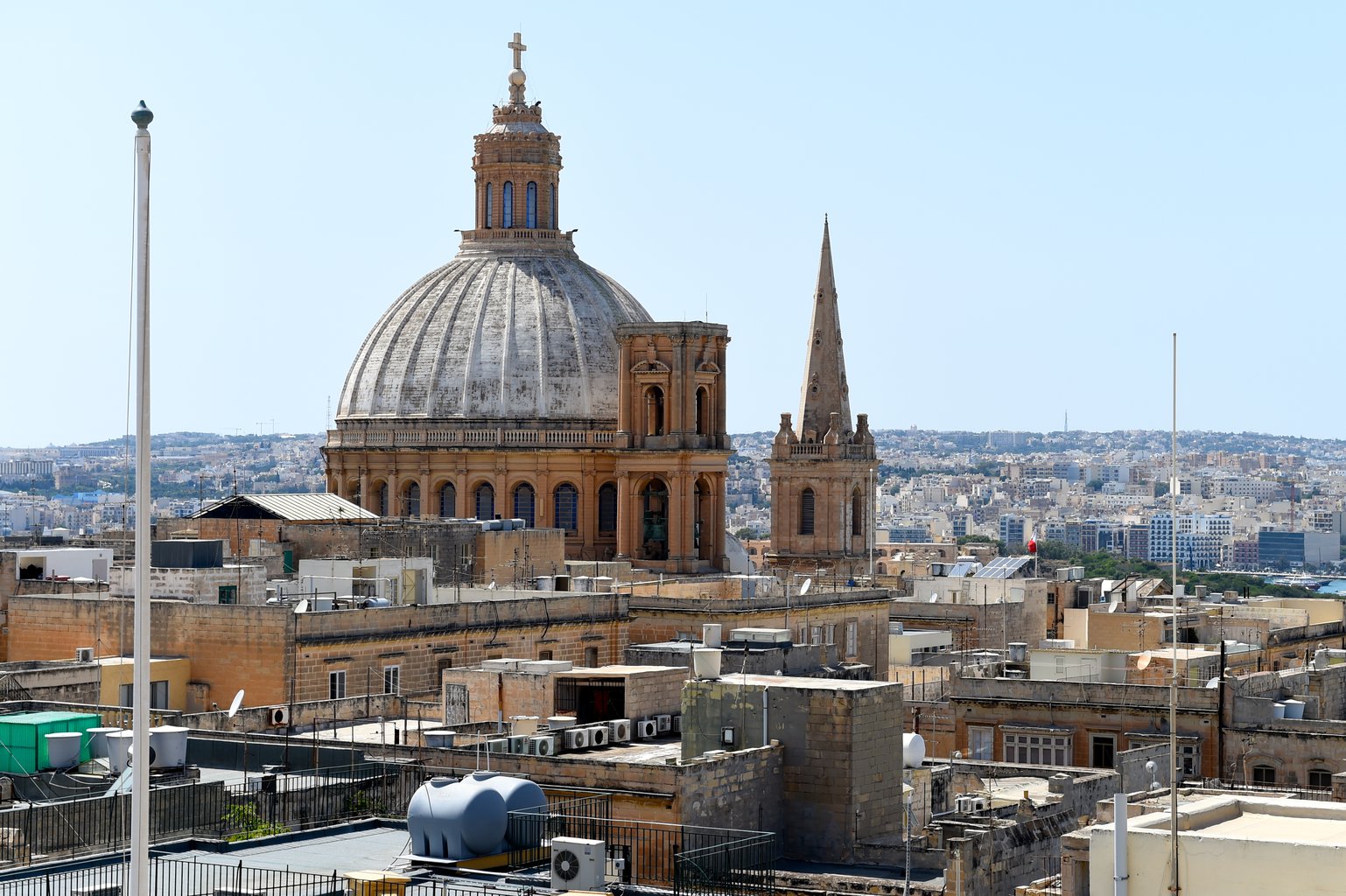- More than 150 million Euro of capital gains and interests connected to Fashion TV investor and Russian billionaire Oleg Boyko and his partners passed through Malta with close to zero tax paid
- Therefore a company that charges its European customers with interest rates that can rocket over 700 per cent is backed by a man who pays almost no money on his profits on this business
A more concise version is here
Written by Blaz Zgaga, with contributions by Vlad Odobescu, Matthew Vella and Sergejs Pavlovs. Illustrations by Sorina Vazelina and Timi Nicky
EXECUTIVE SUMMARY
Based on the exploitation of many of Europe's poorest and most vulnerable citizens, and thanks to Malta's generous tax system, Russian and Latvian businessmen enjoy a luxury lifestyle and financial burden of near-zero taxes.
Fashion TV co-owner Oleg Boyko is a Russian billionaire who made his fortune during the ex-USSR's privatization frenzy in the 1990s, before turning to gambling, media and financial services. One of his recent major investments is in fast loans, where his companies supply small amounts of money to those in desperate need of cash. Their customers often end up repaying the loans at massive interest rates.
52 year-old Boyko is the 75th wealthiest Russian (according to Forbes), although he has an Italian passport, so enjoys all the rights of an EU citizen. He has hidden his fortune in Cyprus and the Bahamas, and purchased Latvian start-up 4finance in 2011, which provides fast loans with usury interest rates in Europe and America.
His company paid at least 105 million Euro for shares in this Riga-based business - cash which was distributed through Malta corporate structures to eight Latvian and Russian founders and beneficial owners. These Maltese companies do not appear to have one single employee and pay no significant corporate tax.
Additionally, in 4finance, which is expanding its fast loans operations to other continents, they established a system of loans to its shareholders with 15 per cent interest, through which the parent company drains the profits of subsidiaries from many European countries where 4finance operates. In this way 4finance Malta Ltd. collected almost 68 million Euro in loan interest between 2013 and 2015 and shifted profits from other countries to Malta, forwarding them to the parent company in Luxembourg.
Another Maltese company owned by Boyko financed a business operation providing fast loans in the USA with the help of Native American Indian tribes in Montana and Wisconsin with interest rates that can rise over 700 per cent.
According to Maltese legislation and tax practices, all these untaxed or low-taxed financial transfers are legal. This story reveals how Malta, which currently holds the EU presidency, attracts wealthy people and foreign corporations who want to avoid taxation in their own countries.
It shows in minute detail how rich people operate behind companies in tax havens - while their customers face ballooning debts that force them to leave their home country to find work to pay back interests on their loans.
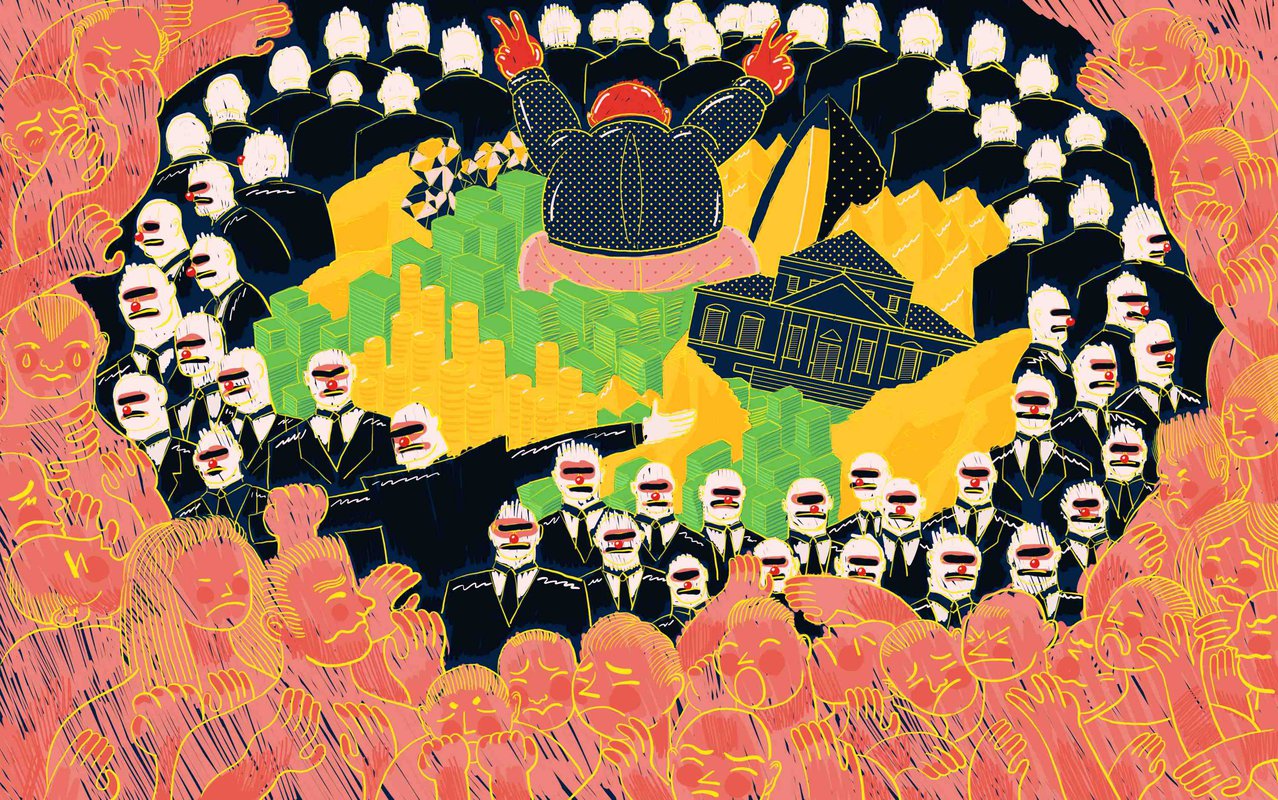
THE CUSTOMER
Romania. Late 2015. Despite only being in his 30s, Daniel* is following a complicated treatment for lymphatic cancer. In theory, Romania offer free medical care to its citizens. In practice, patients have to pay for essential drugs and bribe doctors, nurses and orderlies for medical services. These costs can cripple a family's finances. And Daniel is no exception. He borrowed money from relatives and friends, and took loans out from banks to by drugs to treat his cancer. But now he has run out of options.
So he turns online. To a fast loans company Zaplo. On TV and on the Internet if offers “no interest rate or commission” for the first loan. And immediate money transfer. It seems too good to be true.
Daniel makes a contract online in his wife's name, because she has a better credit history than him. That day in November 2015, 800 RON (175 Euro) flashed up in her account.
Although Daniel already had cancer, this was when the nightmare began.
Daniel was hit by bills from every direction and could not pay back the 175 Euro in time. In two months, the amount doubled to 350 Euro. Zaplo customer centers - manned by real people and robot callers - contacted him every day. They sent him emails. Letters. They wanted their money back.
They reached a deal. He would pay the 350 Euro in two tranches. At first, Daniel paid back the initial amount.
“But after you tie yourself up, you cannot get rid of them,” he says now.

When he couldn’t pay the second part, Zaplo took the case to court. Daniel says that his family wasn’t notified about the trial.
In late February 2017, the court imposed a foreclosure for 2,647 RON (approx. 585 Euro), which included penalties of 1,598 lei (353 Euro) and commissions - which doesn’t mention the sum that was already paid. The effective annual interest rate became 1,988.6 per cent.
“Without any warning, after several months, my wife received a notice from a bailiff that her account would be blocked,” Daniel says. The amount they needed to pay also included about 100 Euro for the bailiff. His wife's entire monthly income was frozen, although Romanian law states that, in such cases, only a third of the monthly income is subject to such action. “They deprived a family of its food,” Daniel argues.
Meanwhile, he finished the treatment for cancer. To cover his debts, he left to work in Germany.
“I had to leave Romania because of some thieves who deceived me and lied to me,” he says.
He has no money to contest the court decision - and has few hopes his situation will improve. “We are poverty-stricken - and they [Zaplo] take advantage of that,” he adds. “I pray to God that the cancer will not come back. Because if I relapse, I'll go and kill them [Zaplo]. I'm leaving this life with my hands on their neck.”
Daniel’s case is far from singular. Zaplo IFN started to offer fast small loans in Romania in June 2015 and by April 2017 the company was involved in 1,570 cases in Romanian courts against clients - the vast majority foreclosures. The business, it seems, depends on customers not paying their loans back in time.
Other Romanian clients told us the same story of ballooning interest rates after the first month. Take 62 year-old Ana Kosa. She needed 132 Euro to cover basic expenses to supplement her 88 Euro a month pension. After failing to pay back the amount after 30 days, the costs swelled to 308 Euro, forcing the pensioner to move to Austria to work as an elderly carer.
“They [Zaplo] kept calling me and saying they will come to recover the amount,“ she says. “But for 1,400 lei (308 Euro) what can they take from me?”
Romanian lawyer Adrian Cuculis says clients of fast loans constitute one third of his cases - a number in the high hundreds.
But Zaplo seems to be operating in a grey area.
“The Romanian authorities have minimum information about companies such as Zaplo,” he adds.
Zaplo IFN is not a standalone Romanian company. It is subsidiary of Latvian based AS 4finance which operates in 17 European and American countries.
Interest rates can increase to even 2,000 per cent per year. This has caught the attention of consumer protection agencies.
In 2016, the Finnish Consumer Ombudsman applied for an injunction on a 4finance subsidiary on the grounds of unlawful credit granting practices - stating that a 2,010 Euro credit could balloon into 4,145 Euro in six months due to late payments.
In 2015, the Lithuanian central bank has accused a 4finance subsidiary of multiple legal violations, and in Denmark, 4Finance subsidiary Vivus violated Danish marketing laws by stating on the website that the interest rate on a loan was 19 per cent. According to the Danish consumer ombudsman, the correct figure would have been 730.1 per cent. This year Vivus accepted to pay a fine of about 40,000 Euro.
But while it preys on vulnerable citizens across the continent, its former and current owners are using tax avoidance schemes in Luxembourg, Cyprus, Panama and Bahamas. One of the most important tax friendly country for beneficial owners who profits on poor European citizens with fast loans is - Malta.
THE FAT CATS OF MALTA
“A Fat Cat is a smug, selfish and greedy businessman who exploits their position for their own personal gain at the cost of the businesses or community,” states the English Urban dictionary.
Yet owners of 4finance who are hidden behind Malta companies seem so confident in their business operations that they named the company through which they funnel more than 100 million Euro to their bank accounts without any significant tax paid as… Fatcat Investments Limited. They could hardly find a better word to define an unregulated business run across two continents.
However, their marketing description of their services is more polished: “Smart lending made simple. 4finance is a global leader in digital consumer finance. We get money to you in a fast, convenient way that fits your lifestyle,” says their website.
4finance claims to be “Europe’s largest and fastest growing online and mobile consumer lending group”. Its method is to supply loans “quickly, conveniently and responsibly”. Since establishing in 2008, it has provided more than 11.5 million Single Payment, Line of Credit and Installment Loans totalling over 4.0 billion Euro.
However, dozens of millions of Euro in profits are collected with usurious interests rates on small loans. These are given to the poorest European citizens who then struggle with an army of lawyers to repay debts with interests rates which sometimes exceeded many hundreds percents annual rate.

Current owners of 4finance, Russian billionaire Oleg Boyko and his Latvian partners, enjoy a lavish and luxury lifestyle in contrast to his clients, who are usually the working poor, captured by the marketing trap of a fast small loan.
With an estimated wealth of 1.2 billion USD, Oleg Viktorovich Boiko is the 75th most wealthy Russian, according to Forbes. He is an owner of global private investment group Finstar Financial, which had two billion US dollars assets under its management in 2016. Its CEO is Nicholas Jordan, formerly of Goldman Sachs, Deutsche Bank and UBS.
Boyko’s Ritzio International gambling group operates more than 150 gambling clubs in countries such as Germany, Italy, Romania and Croatia. Besides Russian citizenship, Boyko obtained an Italian passport in February 2008, and is a European Union citizen. Through the British Virgin Islands company FTV BVI Ltd, Boyko co-owns the Fashion TV channel, which reaches hundreds of millions of viewers in more than 140 countries all over the world.
He remains a close friend of top Russian billionaires Roman Abramovich, Alisher Usmanov and Suleiman Kerimov and first deputy Prime Minister of Russia Igor Shuvalov.
During summers, when he is not at his luxury villa in Blevio at Lake Como in Italy, he rides the 45-meter long Blade, one of the fastest yachts in the world with a speed of 44 knots. A recent passion is Hollywood films. He co-produced Frank Miller’s Sin City: A Dame to Kill For and it has been announced that he is co-producing the directorial debut of 'Lost in Translation' and 'The Avengers' actor Scarlett Johansson - Summer Crossing.
4finance group, which purchased TBI bank in Bulgaria in 2016, is not his only lending company. In 2016 Boyko purchased a 51 per cent share in Spanish Prestamos Prima – through another Maltese company Allectica Limited. In the same year he invested 31.5 million in Berlin-based internet lending platform Spotcap, which provides small fast loans to small end medium enterprises in at least five countries from Netherlands and UK to New Zealand. He also purchased Liberty bank in Georgia.
However, using leaked documents and the pubic registry, the Malta Files reveals that Oleg Boyko controls his business empire network of offshore companies where he pays next to zero taxes.
THE SECRET OF THE BAHAMAS
One of the major centres of Boyko's business empire is Cyprus-based company Tirona Limited. The trustee of Tirona Limited is hidden in Nassau, the capital of the small Caribbean island state of Bahamas, where the company Feldmans Services Limited has been set up. According to documents obtained by the European Investigative Collaborations (www.eic.network), the Bahamas company provides nominee services for its ultimate beneficiary - Oleg Viktorovich Boyko.
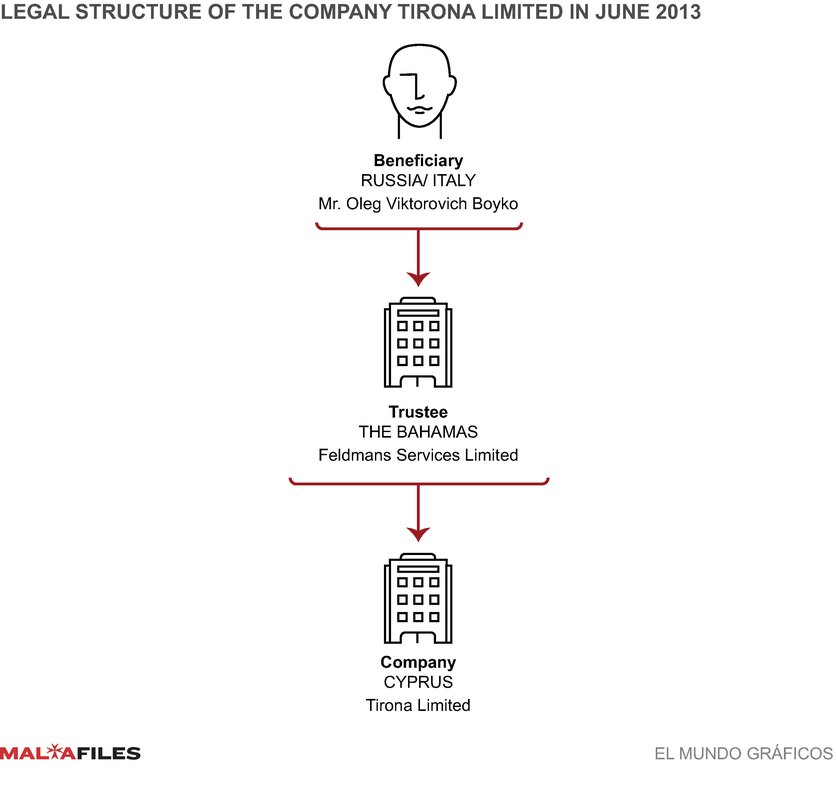
This Bahamas company is under the control of Cyprus based Feldmans Management (Overseas) Limited, a boutique accountant company with two officers, Daria Kozlova Michalidou and Olena Tkachuk, who operate in Cyprus, the British Virgin Islands, Bahamas and Seychelles and which is responsible for the management of Oleg Boyko's wealth.
According to a prospectus filed by 4finance to the Irish stock exchange in 2013 “Tirona is part of Finstar Financial Group, one of the largest private investment groups in Russia, and is ultimately beneficially owned by Mr. Oleg Boyko.” But the Bahamas company Feldmans Services Limited is the main company through which he controls his business empire.
LATVIAN SHAREHOLDERS HEAD FOR BELIZE AND MALTA
The fast loans business that has spread its tentacles across Europe and America began in the post-Communist state of Latvia. In February 2008 four Latvian school-friends from the elite Stockholm School of Economics in the capital Riga founded a start-up, AS OC Finances. The men were Alberts Pole, Kristaps Ozols, Māris Keišs and Aigars Kesenfeld. All young and smart. Their company was a great success among the new Baltic enterprises. The business model - providing small loans to customers via their internet platform, text messages and phone calls - attracted many customers. It seemed they had invented a money-making machine.
Then Latvian businessmen connected to the local political and business elite - Uldis Arnicans, Edgar Dupats, Maris Martinson and Russian citizen Ilya Nikulin - joined the four founders and school-friends on 15 December 2009 as shareholders. Together they founded joint parent holding company in Malta and named it Fatcat Investments Limited. The new investors took the majority shares and decisive roles in the start-up.
These four new shareholders were close to Latvia's power elite. Young lawyer Edgars Dupats in 2014 married the daughter of former Latvian prime minister Andris Skele, a local ex-oligarch with a reputation similar to Silvio Berlusconi. Also Uldis Arnicans is a well-known businessman connected with one of Skele’s family business. Both Dupats and Arnicans have remained, alongside Boyko, as shareholders of Tirona Limited, the main owner of 4finance group as we went to press. On the other hand, the real-estate businessman Maris Martinsons has been involved in a major corruption scandal and criminal investigations. The fourth new shareholder, Ilya Nikulin, is a professional Russian ice hockey player in Moscow.
Their company was renamed AS 4Finance in September 2011. However, until 9 December 2011, all eight shareholders of Malta’s Fatcat Investment Ltd were additionally hidden behind seven “international business companies” registered at the same address in the Central American offshore jurisdiction of Belize, plus one company registered in another European tax haven, Cyprus.
Kristaps Ozols was hidden behind Estimate Investing Limited, Alberts Pole behind Sommer Invest Limited, Maris Keiss was owner of Summit Finance Limited, Aigars Kesenfelds of Walsden Invest Limited. Besides the four founders, the four new shareholders were well disguised. Edgars Dupats owned Verveks Invest Limited, Uldis Arnicans Wealth Investments Limited, and Maris Martinson was hidden behind Prosperity Financing Limited. All seven companies were registered at the same address Withfield Tower, Third Floor, 4792 Coney Drive, P.O. Box 1777, Belize City, Belize. The eighth shareholder Ilya Nikulin was behind Cyprus based company V.C. Vertice Consulting Limited.
The first report that local politicians and businessmen were connected with 4finance was broadcast on Latvian TV program “De Facto” in February 2013. They showed information that Dupats, Arnicans, Martinsons and politician Andris Ameriks were giving loans to 4finance. But there was no information in the public domain that Dupats, Arnicans and Martinsons were also the ultimate beneficial owners. Only the politician Ameriks said that in 2010 he gave a 500,000 Euro loan to local guys who established that company. Dupats, on the other hand, told the media that, as a lawyer, he was a Fatcat Investments representative in a 4finance shareholders meeting, but didn’t reveal that he was also one of the beneficial owners hidden behind the Maltese company.
As they were hidden behind companies in Belize, it seemed impossible for the media and local tax authorities to determine their shares and involvement in this profitable but usurious business.
But in December 2011 seven beneficial owners became owners of new Maltese companies which replaced the Belize companies as shareholders of Fatcat Investments Limited. The majority shareholders, with 19.5 per cent shares each, were Uldis Arnicans behind G-Interactive Limited, Aigars Kesenfelds with ABS Holding Limited, Maris Martinson behind Nessa Limited and Ilya Nikulin with Cyprus company V.C. Vertice Consulting Limited. Seven per cent of the shares were held by Edgars Dupats in Mercalia Partners Limited, while three founders Alberts Pole, Maris Keiss and Kristaps Ozols retained five per cent of shares in companies AJG Partners Limited, VS Ventures Limited and LVS Limited.
TAKING FAST LOANS TO NEW LEAGUE: ENTER BOYKO
December 2011 was an important month as the Latvians were about to become quite rich. Russian billionaire Oleg Boyko decided to purchase a majority 75 per cent share in their perspective fast loans start-up, which had subsidiaries only in Lithuania, Sweden, Finland and Denmark at this time.
According to “Share purchase agreement in relation to AS 4finance”, dated 21 December 2011, Boyko’s Tirona Limited paid 55 million Euro to Fatcat Investments Limited for the purchase of the 75 per cent shares of fast loans company AS 4finance, with its headquarters in Riga, Latvia. The first tranche, worth 12 million, was paid a few days after the conclusion of the deal.
Due to the first tranche of Boyko’s payment to Fatcat Investments Ltd, its profit in 2011 skyrocketed to 26 million Euro before taxes. According to Fatcat's “Report and financial statements for the year ended 31 December 2011” the company's profits increased significantly compared to the previous year. If they had 4.2 million Euro profit in 2010 from fast loans operations in five countries, they reached almost 14 million Euro profits for the same business operations in 2011 with only 92 employees. But Boyko’s first tranche in the sum of 12 million Euro raised profits of Fatcat Investments even higher, to 26 million Euro before taxes.
“The substantial increase in the profit resulting in the year under review is attributed to the transfer of the first tranche,” said a report, referring to Boyko’s first 12 million Euro for the purchase of majority shares in the company AS 4finance.
Effective taxation in Malta for Fatcat Investments was quite low for European standards. The company had 26 million Euro in profits and paid two million Euro taxes that year, which represented seven per cent.
In 2011, the Latvian shareholders of Fatcat didn’t pay themselves any dividends, nor in 2012, when an additional 43 million Euro from Boyko’s Tirona Limited company was transferred to Maltese bank accounts. “The company’s profits were derived from a gain on a sale of a subsidiary and interest received to its participating parties,” Fatcat’s annual report for 2012 says. Ownership in the major AS 4finance company was then shared by 75 per cent of Tirona Limited and 25 per cent of Fatcat Investments Ltd.
The Latvian shareholders enjoyed the benefits of the Maltese taxation system. For the year 2012, when Fatcat reached 43 million Euro in profits, the company paid only 366,762 Euro taxes on profits, which represents 0.7 per cent.
HOW MALTA FAVOURS THE RICH
Malta charges companies at the highest rate of income tax - 35 per cent - on their profits. But if the company's activities and shareholders are mainly based abroad, they have a refundable tax credit mechanism that results in a significantly reduced tax rate on income or gains that can go as low as five per cent. Additionally, in Malta there is no withholding tax on dividends, interests and royalties. And Maltese tax on capital gains for non-residents, which should include Boyko’s purchase of shares in 4finance, is a whopping zero per cent.
After restructuring, Fatcat Investments Ltd. remained a vehicle for collection and non-taxable distribution of dozens of millions of Euro to Latvian businessmen.
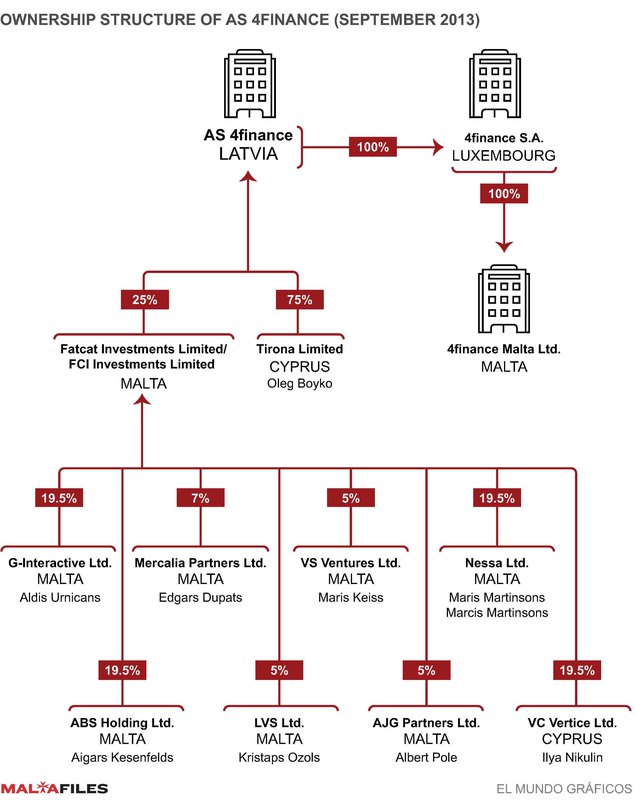
A major event came in July and December 2013. In the summer, Fatcat Investments distributed 57 million Euro of “interim dividends” to all eight companies owned by seven Latvian businessmen and the Russian hockey player. But that is not all. After renaming Fatcat company into FCI Investments Ltd in autumn, the company received a further 51.6 million Euro from Boyko’s Tirona Ltd for the remaining 25 per cent shares in AS 4finance.
This is confirmed by an “option deed” signed by Tirona Ltd and ultimate beneficial owners of Maltese companies on 3 December 2013.
With remaining incomes from dividends (three million Euro) and interests (2.7 million Euro), the company reached profits in the sum of 56.7 million Euro and paid its shareholders additional dividends on the 1 January 2014 in an additional sum of 57 million Euro.
Shareholders therefore received 114 million Euro of dividends in only half a year. But by using many tax optimization and avoidance schemes they paid almost next to zero taxes.
How did they manage to funnel money out of Malta jurisdiction to local companies and personal bank accounts? The answer is simple: with shareholder loans.
CHAINS OF SHAREHOLDER LOANS AND LESS THAN ONE PER CENT TAX
We will focus on the distribution of millions from the second December 2013 payout, but the methods of distribution were the same as in July 2013.
As reveals “FCI Investments Limited trial balance as at 31 December 2013” shareholder loans worth 57.7 million Euro were given by parent holding company FCI Investments Ltd (former Fatcat Investments Ltd) to its shareholders in December 2013. Two major shareholders Aldis Arnicans (G-Interactive Limited) and Aigars Kesenfelds (ABS Holding Limited) received loans amounting to 18.4 million Euro each. These were calculated at the same percentage as their shares in the company – 31.97 per cent. Edgars Dupats (Mercalia Partners Limited) received 6.6 million Euro of shareholder loans or 11.48 per cent and the remaining three founders Alberts Pole (AJG Partners Limited), Maris Keiss (VS Ventures Limited) and Kristaps Ozols (LVS Limited) received 4.7 million Euro each for their 8.2 per cent shares.
And what happened to other two major shareholders Maris Martinsons (Nessa Limited) and Ilya Nikulin (V.C. Vertice Consulting Limited) who had 19.5 per cent of shares each? According to an option deed signed on 3 December 2013 between Boyko’s Tirona Limited and sellers of the remaining 25 per cent shares in 4finance, its outgoing shareholders planned to sell shares to the remaining shareholders in two stages.
During the first stage, Martinsons and Nikulin left the company in December 2013. For their shares, the remaining six shareholders paid Martinsons’s Nessa Limited 13.4 million Euro and 11.3 million Euro to Nikulin’s Cyprus based V.C. Vertice Consulting Limited.
The second stage happened on 15 October 2014, when the companies of the three founders Alberts Pole, Maris Keiss and Kristaps Ozols left the shareholder structure of FCI Investments Limited. According to a “Share purchase agreement” the aggregate price for shares of all three companies was only 32,950 Euro.
But let's return to the shareholder loans worth 57 million Euro given in December 2013. Soon after the option premium deed was signed and Boyko’s Tirona transferred 44.5 million Euro in cash to FCI Investments Ltd and the remaining sum was paid by 7.8 million Euro worth of bonds, the main parent company FCI Investments Ltd started to wire cash to its Latvian shareholders.
On 12 December 2013, when Martinson and Nikulin received their millions, also Aigars Kesenfelds, for example, received 14.7 million Euro of cash to the bank account of his ABS Holding Limited opened at Sparkasse Bank Malta plc. Uldis Arnicans received 11.7 million Euro in his G-Interactive Ltd account opened in the same bank. Other shareholders received correspondingly smaller sums of cash.
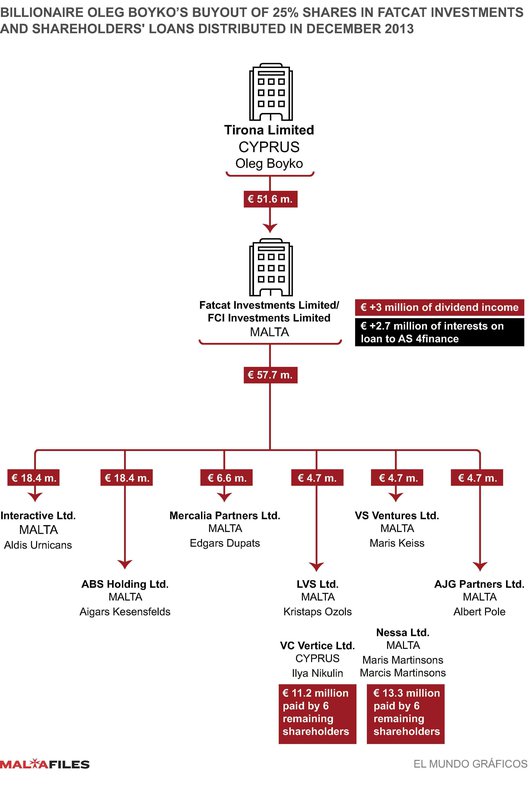
According to the signed financial statements for 2013, FCI Investment Limited paid only 512,501 Euro in taxes in Malta that year. It had 57 million Euro profits before taxation and 106 million Euro of “net cash flow from financing activities” that year. Therefore they paid only 0.9 per cent of taxes on profits. This is only tax on money released for dividends' distribution in July 2013. The distribution of an additional 57 million Euro of dividends from December 2013 was transferred into the following accounting year – on 1 January 2014.
This is a date when many interesting business events happened. On 1 January 2014 shareholders signed set-off agreements with FCI Investments. Uldis Arnicans’s G-Interactive Ltd., for example signed an agreement whereby its 18.4 million Euro shareholder loan was set-off with 18.2 million Euro of dividends. In this way his loan to FCI Investments was almost fully repaid overnight and, after this operation, he owed only 209,981 Euro to parent FCI company. Exactly the same numbers were also implemented in Aigars Kesenfelds’s ABS Holding Ltd. case. Other beneficial owners set-off their shareholders loans with dividends with appropriately smaller sums on the very same date – 1 January 2014.
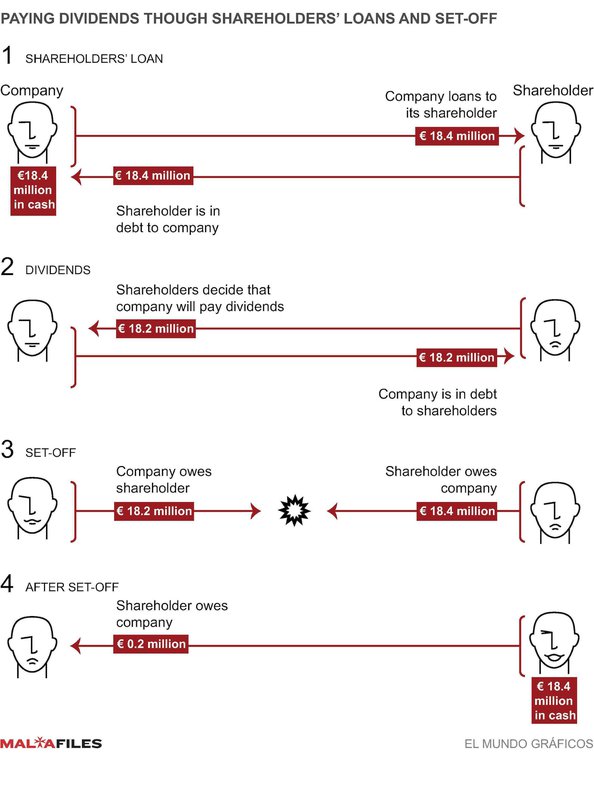
But this date is also important due to another document – the claim for refund – sent by the director of G-Interactive Ltd Ivan Vella to the Maltese Inland Revenue Department – International Taxation Unit, revealing that shareholders reported a much smaller sum of received dividends to Maltese authorities.
As said, on 1 January 2014, G-Interactive received more than 18 million Euro in dividends. Also “G-Interactive accounts for the year ending 31 December 2014” reveals in this year it has 18.6 million Euro described as dividend income in its accounting books.
However, when they decided to use the advantageous Maltese tax system - which offers also two-thirds refund of tax paid on dividends and thus lowering it from 15 to five per cent, Ivan Vella reported the different number.
In a tax refund claim dated 17 October 2014 there is no sign of the 18 million Euro dividends paid on 1 January 2014. Instead, on the same date, a much smaller sum is reported to Maltese tax authority – only 1.09 million Euro of gross dividends. Of this sum, the company paid 163,804 Euro in taxes - 15 per cent - and received ten per cent back or 109,203 Euro of refunds from the Maltese tax authority. Therefore, it paid only 54,601 Euro or five per cent of the declared sum.
Dividends received on 1 January 2014 from FCI Investments Ltd through shareholder loans were, according to this set-off agreement, worth 18.2 million Euro. Therefore G-Interactive Limited paid only 0.3 per cent tax on this dividend income.
According to a Maltese accountant, who wishes to remain anonymous, this is fully legal, thanks to an agreement to avoid double taxation signed between Malta and Cyprus in 1994 and the fact that capital gains of foreign residents are not taxed in Malta.
Because of this loophole, for example, at least 40.7 million Euro of Boyko’s Cyprus based Tirona Limited paid in cash to Fatcat Investments in 2012 for shares in 4finance are “exempt income” and thus without any taxation in Malta. This is confirmed by the Income Tax Return of FCI Investments Ltd filed on 8 August 2013, which reveals other tax exemptions on foreign incomes worth additional million Euro.
FUNNELLING MILLIONS FROM MALTA TO LATVIA
Maltese companies with Latvian beneficial owners who received more than 100 million Euro from Boyko were bursting with cash. They needed to transfer their millions somehow to Latvia or use it for new investments. And, of course, pay as little tax as possible during this process.
The solution was again found in shareholder loans. There were dozens of shareholders loans given from Maltese companies to Latvian companies owned by the same shareholders. For example, G-Interactive Ltd loaned two million Euro on 18 March 2014 to Latvian company SIA ZOL28, represented by Uldis Arnicans, who is also a tax resident of Monaco, which has zero per cent tax on foreign personal income.
On the same date in March 2014 his company G-Interactive loaned an additional two million Euro to the company SIA UG-70, again represented by Arnicans. Three days later, on 21 March 2014, his company loaned 3.5 million Euro, to Luxembourg 4finance Holdings S.A.
According to the accounting books, Arnicans received at least 1.5 million Euro in loans from G-Interactive personally to his bank accounts in 2014. In that year G-Interactive reached 12.3 million Euro in profit and paid only 266,382 Euro in taxes - or two per cent.
Most interesting is that in July 2015 Arnicans started the liquidation of G-Interactive, which ended in September 2015. In this process he assigned all loans, given by G-Interactive to other companies, to himself personally, so many other entities and companies later needed to return these loans directly to his personal bank accounts. Loan proceeds are not taxed anywhere. Only interests are usually subject to taxation.
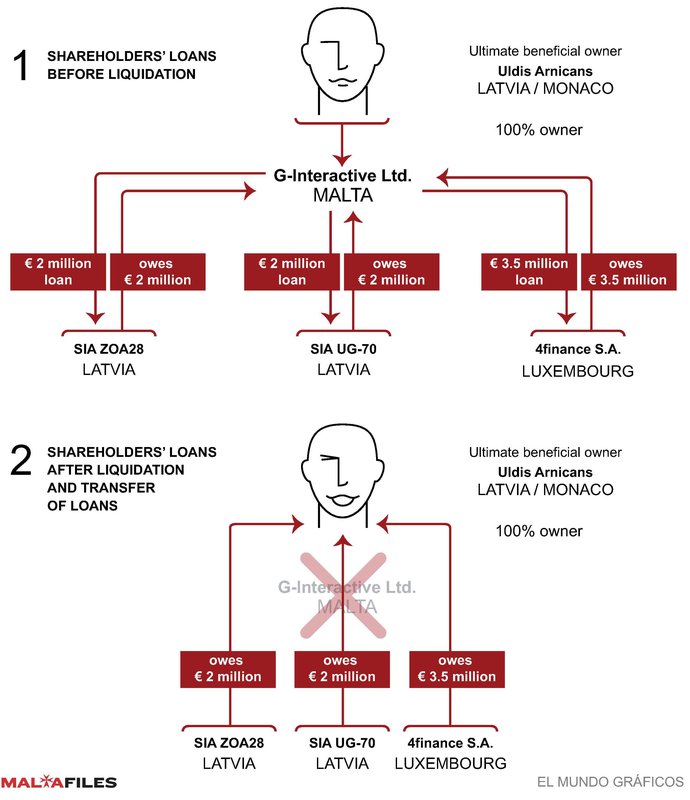
The second major shareholder Aigars Kesenfelds, who received the same amount of 18 million Euro from FCI Investments to ABS Holdings, opted for other methods. He decided to finance new investments and start-ups.
For example, ABS Holdings gave a credit line worth 2.5 million Euro to Lithuanian company UAB Mogo in April 2014. This is one of the subsidiaries of start-up Mogo Finance, which focuses on car leasing (hire-purchase) and was founded in 2012 in Latvia. Kesenfelds invested in this company also in 2012 and 2013.
In Spring 2014 ABS Holding gave loans to other companies, including Dotcom Enterprises (4.5 million Euro), Dyonne Trading (3.1 million Euro), SIA Daugalas Iela (850,000 Euro) and many others.
All these proceeds initially paid by Boyko’s Cyprus company for share in 4finance were taxed according to Maltese standards. In 2013, for example, ABS Holdings reached 12.3 million Euro in profits and paid 576,000 Euro or 4.6 per cent of taxes in Malta.
The remaining Latvian shareholders of FCI Investments tried to get money from Malta to their own bank accounts or invest it further in a similar way.
Malta's lax taxation and exemptions on capital gains tax allowed more than 100 million Euro paid by Boyko for shares in fast loans company 4finance to be distributed to Latvian beneficiaries almost without any tax paid.
When EIC Network asked the Latvian and Russian shareholders of the Maltese Fatcat Investment Ltd how much tax they paid and in which jurisdiction, no one replied except Edgars Dupats, who remains, with Oleg Boyko, a partner in Tirona Limited.
“The undertakings of private business companies, including those with my participation and shareholder status, are supervised and audited in line with the laws of respective jurisdiction and best industry practice,” says Dupats.
“Regarding your questions on holdings in other jurisdictions, the need to establish a legal entity in a particular jurisdiction arises from business requirements of its shareholders. Given the fact that the particular jurisdiction of Malta operates under the Common Law, such [a] legal structure allows [us] to secure fast and quality resolutions of any shareholder disputes.”
No Fatcat shareholder responded to questions regarding whether they owned a company in Belize. Neither did they respond to phonecalls. Oleg Boyko and the director of Tirona Limited, Andreus Loucas, as well as 4finance, and Zaplo Romania didn't answer to questions sent by EIC Network.
15 PER CENT INTERCOMPANY LOANS FOR SHIFTING PROFITS TO MALTA
Latvian beneficial owners who sold their shares gained significantly from this Maltese taxation scheme. But how well did this perform for Oleg Boyko, who invested large amounts of money into the dynamic and profitable fast loans business?
He soon established full control over 4finance group, liquidated FCI Investments, and now - with the assistance of two Latvians Uldis Arnicans and Edgar Dupats - controls the whole group through Tirona Limited (Cyprus). Boyko is hidden in the company structure behind his 75-year old relative Vera Boyko, who is the beneficial owner of 49 per cent shares of the Cyprus company, which is controlled by nominee shareholder and director Loucas Andreou. The remaining 51 per cent is distributed equally between his partners Arnicans (25.5 per cent) and Dupats (25.5 per cent), both connected to the influential Latvian Skele family.
After he took control of the fast loans company, Boyko immediately restructured it, set up a 4finance Holding S.A. in Luxembourg and started issuing bonds which financed the expansion of fast loans operations in subsidiaries in more than 17 countries. The first issuance of bonds by Latvian AS 4finance was in July 2013, when they issued 170 million USD in senior notes with 13 per cent interest rates on the Irish Stock Exchange (ISE) in Dublin. In August 2014 the Luxembourg based 4Finance S.A. started to issue bonds. First they managed to sell senior notes on the Irish stock exchange worth 68 million USD with 11.75 per cent interest rates. A year later, in August 2015, it issued 375 million Swedish kronas with 11.75 per cent interest rate in Stockholm. And finally, in 2016 they sold 150 million Euro senior notes on the Frankfurt Stock Exchange with 11.25 per cent interest rates.
With billionaire Boyko at the helm, fast loans became a big business. He expanded operations of 4finance to the Americas and the Caucasus. However, high interest rates for issued bonds demanded also high interest rates in shareholder loans between the parent company and subsidiaries, which were providing dozens of thousands of small loans in many countries. Parent 4finance company needed high enough interest income to finance repayments of bonds issued at high interest rates.
A solution was again found in Malta with its lax taxation system. 4finance S.A. Luxembourg branch founded its Maltese branch 4finance Malta Ltd in January 2013 and transferred the majority of its loans to the new company. This is confirmed by a request to open a bank account in Malta which describes: “4finance Malta is branch of 4finance S.A. who is providing finance to the group companies. 4finance S.A. has allocated the responsibility for the administration of each loan to the Malta Branch.”
Additionally, a 4a finance group chart, dated April 2013, reveals that the Luxembourg company is providing loans to affiliates in different countries and then attributing loan receivables to the Malta branch, where interests from different countries are collected. “It is estimated that 4finance S.A. shall issue loan facilities to the 4finance OpCo’s within the following 12 months comprising to EUR 100-130 mio in total,” they declared. “It is estimated that the income flow from interest payments received by Malta branch within the following 12 months shall comprise to EUR 15-20 million.”
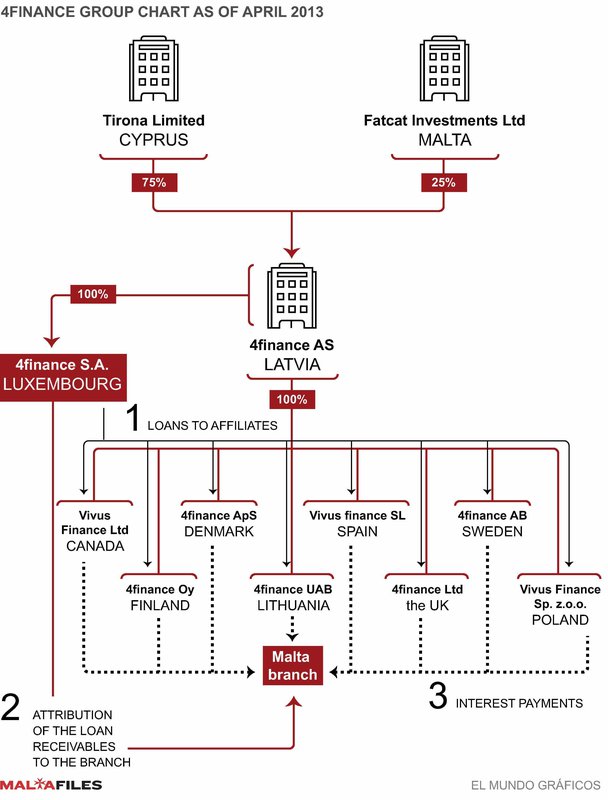
According to the spreadsheet “Lux_Interest_30112015” many shareholders' intercompany loans given to local subsidiaries between 2013 and 2015 have 13.75 per cent or even 15 per cent annual interest rates.
This might be problematic if local tax authorities inspect the subsidiary company, as these shareholders loans could be significantly higher than similar loans available on the local market over a specific time. In this case such high interest shareholder loans could be an unjustifiable transfer of money from a local subsidiary to a parent company.
Therefore, the Malta 4finance branch - without a single employee - managed to collect at least 45 million Euro of interest between 2013 and 2015 from the 4finance subsidiaries of 21 countries.
This spreadsheet reveals it collected 17 million Euro of interest on loans given to five Latvian companies, including the main AS 4finance. Further, they managed to funnel 6.4 million Euro in the form of interests from Poland, 4.3 million Euro from Spain, 3.4 million Euro from Sweden, 2.3 million Euro from Finland and 1.5 million Euro from Denmark. From their neighbouring Lithuania they transferred to Malta four million Euro in the form of interests and two million Euro from Georgia. Other countries lost a smaller part of profits, which were shifted to the Malta branch.
According to documents, a significant amount of interest was collected on 3 December 2015 by 4finance Malta and paid by many subsidiaries to the Luxembourg-based 4Finance S.A. bank account opened at the Maltese-based IIG bank.
A financial report from the Malta branch for 2013 reveals the company had loan receivables worth 98 million Euro at the end of that year. All loans except one had a 15 per cent annual interest rate, with only the Georgian branch showing a 20 per cent interest. 4finance Malta branch therefore collected 8.6 million Euro of interest, but its declared profit was lowered by a 6.6 million Euro impairment, therefore it was only 1.4 million Euro. In 2013, the company paid only 12,774 Euro taxes or 0.9 per cent.
Both receivables and interest income increased significantly in 2014 and 2015. Annual accounts reveal that in 2014, the Malta branch received 24.9 million Euro interest income from other 4finance subsidiaries and 34.2 million Euro in 2015. The Malta branch of 4finance collected 67.9 million Euro of interest between 2013 and 2015 from many European countries.
Malta thus seems to be quite a suitable vehicle for a financial service where dozens of million of Euro of interest are funnelled from 4finance subsidiaries all over Europe and transferred to a Luxembourg parent company with next to zero taxes.
4Finance did not reply to comments on this issue.
USA: THE NATIVE AMERICAN LOOPHOLE
Among the subsidiaries who were paying high interest rate inter-company loans to the Malta branch was a US-based company, 4finance US Holding Inc., registered in another tax haven in Delaware. On 24 September 2015 it made a repayment of a loan worth 12 million dollars and, on 3 December 2015, it needed to pay 347,649 US dollars of interest on 15 per cent and 13.75 per cent loans to the Malta branch.
Official operations of 4finance in the United States of America were started only twelve days later, on 15 December 2015, through its subsidiary Zaplo. However, a few years before, 4finance and Boyko’s Tirona Limited covertly financed fast loans to US citizens with the assistance of Native American tribes.
The 4finance prospectus for the Irish Stock Exchange dated July 2013 reveals the following information: “In the United States 4finance Group provides certain management services to the United States company North Star Finance, LLC that advances Single Payment Loans on the United States market.” And added: “4finance Group does not offer loans in the United States but instead provides management and administration of Single Payment Loans services to North Star Finance, LLC, a company wholly owned by GVA Holdings LLC, a subdivision of the Fort Belknap Native American Indian community of Montana, in the United States through its Canada based company, Vivus Servicing Ltd.”
However, available documentation shows that both Latvian 4finance main company and Boyko’s Tirona Limited have covertly financed fast loans operations connected to two Native American tribes since 2012.
For this reason the Maltese company GMLA Trading Limited was incorporated on 1 December 2012. After Boyko purchased 75 per cent of 4finance in 2011, he later received the same shares in this secret company GMLA Trading. The remaining 25 per cent was owned by his Latvian partners through Fatcat/FCI Investments. By December 2013 Boyko owned all shares of GMLA Trading.
As beneficial owner Boyko is hidden behind a few layers of companies. GMLA Trading Limited, registered in Malta, is owned by Fatima Ventures Ltd from Nassau, Bahamas.
A director of the Bahamas company is Cypriot Ellada Pozidou, who is also director of Bahamas based, NG Consulting Limited. Behind this company is Daria Kozlova from Feldmans Management (Overseas) Limited, a person mentioned at the beginning of this article, who takes care of Boyko's wealth. This time she is a nominee of D&M Global Holdings, also based in Bahamas. And at the final end of this covert structure lies Tirona Limited with Cypriot director Loucas Andreou. He is also the nominee for Boyko’s relative Vera as beneficial owner of 49 per cent of Tirona, the other two partners with 25 per cent are Latvians Uldis Arnicans and Edgars Dupats.
But why is such secrecy needed? A reason is hidden in spreadsheet titled “Interest workings March 2014”, which reveals all the loans received and given by GMLA Trading Ltd.
On 20 August 2012 Latvian AS 4finance borrowed the first tranche of 3.6 million US dollars loan with 13 per cent interests to GMLA Trading with a goal to finance fast loans in the USA. By 30 December 2012, the Latvian company received back all loan repayment and also 76,952 dollars of interest.
Much bigger interest incomes was made by Tirona Limited, well hidden as a related company behind a Bahamas structure mentioned above. A credit line in the sum of 30 million USD was opened for GMLA Trading on 1 January 2012 and it had a 12 per cent interest rate until 31 December 2012. From this date until 30 March 2014 it charged a higher 15 per cent interest rate per year. In this way Boyko’s Tirona managed to receive a significant sum out of GMLA Trading in the form of interest.
The source of money for paying these interests were two loans from GMLA Trading. The first credit line, worth a maximum of 20 million dollars with a 15 per cent interest rate, was given to Montana based North Star Finance LLC in August 2012. Until the end of March 2014, the US company needed to pay 2.1 million USD in interests to GMLA. In reality they paid 1.2 million USD interest.
The second credit line, worth a maximum of 20 million dollars, was given to the company Niiwin LLC on 26 September 2013, with a lower interest rate of 10.25 per cent. Niiwin LLC is a company based in Wisconsin and connected to the Chippewa Indian tribe of Lac du Flambeau. Calculations of interest in this part of spreadsheet were not finished. But the loan amount given by GMLA Trading to Niiwin LLC reached six million dollars in March 2014 and 51,634 dollars monthly interest.
Annual reports for 2012, 2013 and 2014 confirm that GMLA Trading Limited is just a vehicle for the transfer of interest paid by US citizens on fast or payday loans to Boyko's Tirona Limited. In 2012 GMLA Trading received 78,541 Euro from US companies and paid 77,396 Euro to Tirona. There were 1,145 Euro in profits. In 2013 interest revenues from the US were significantly higher at 1.2 million Euro and 1.28 million Euro, which were transferred to Tirona. GMLA faced minus 105,238 Euro in losses that year. In the next year, 2014, interest income was even higher at 1.89 million Euro and they forwarded 2.27 million Euro with 282,176 Euro in losses.
Through this vehicle, they created losses in the Malta-based company. And where there are losses, there cannot be any tax on profit.
Altogether Boyko's Tirona Limited received untaxed amounts of 3.2 million Euro of interest from its US clients between 2012 and 2014.
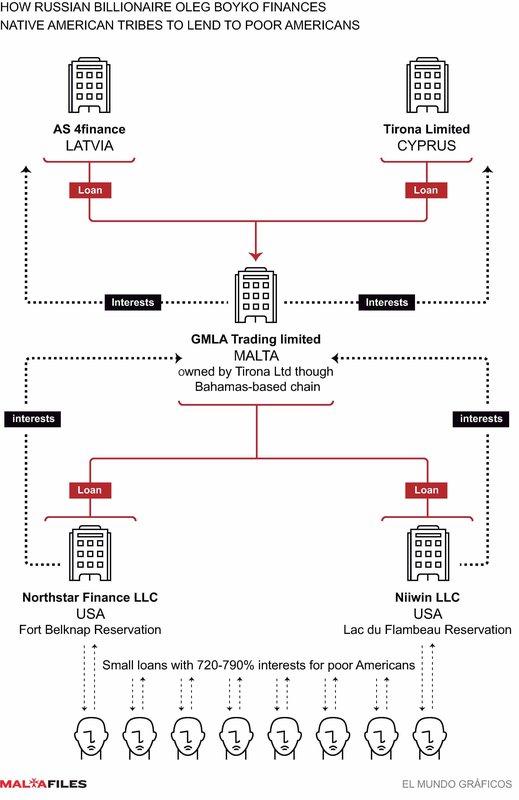
SAME WEB DESIGN: SAME COMPANY?
It is interesting to compare the websites www.northcash.com, owned by North Star Finance, LLC from Montana and www.lendgreen.com, owned by Niiwin LLC from Wisconsin. Both are graphically almost identical to the website of US based 4finance subsidiary Zaplo.com, which started operations in December 2015.
Here they are:



Where the money for millions of Euro in interest which passed through Malta originates from is explained in a few sentences on both websites mentioned above.
“This is an expensive form of borrowing. Lendgreen loans are designed to assist you in meeting your short term borrowing needs and are not intended to be a long term financial solution. The Annual Percentage Rate (“APR”) as applied to your loan will range from 720% to 795% depending on your payment schedule, pay frequency, loan term, and the amount of your loan,” Landgreen's website reveals.
Both Wisconsin-based Landgreen (Niiwin LLC) and Montana-based Northcash (North Star Finance LLC) operate in the entire USA except ten federal states and among military personnel. “Northcash does not lend to residents of Arkansas, California, Georgia, Maryland, Minnesota, Montana, New York, Pennsylvania, Virginia and West Virginia, or to members of the military or their dependents,” the Montana company website says.
In March 2017 the Washington State Department of Financial Institutions (DFI) published complaints it received about some online lenders including North Star LLC, which is based in the nearby federal state of Montana. But it couldn't do anything.
“It appears that these companies may be operating as online tribal payday lending companies. These companies assert ownership by the Fort Belknap Indian Community, a federally-recognized Indian Tribe. These companies are not licensed by DFI and are not registered to conduct business in Washington State by the Department of Licensing, the Department of Revenue, or the Secretary of State,” they explained.
Millions of dollars in loans from Maltese covert company also passed also other US states. For example, Niiwin LLC received its new loan from GMLA Trading Ltd in January 2015 through First Century Bank N.A. branch, based in Georgia - where payday lending is a felony.
Neither Native American tribe Niiwin LLC or North Star Finance LLC responded to questions on why they took such a high interest loan from a Maltese company owned by Russian billionaire. The directors of GMLA Trading Ltd, Tirona Limited and their major beneficial owner Oleg Boyko would not respond to written questions.
All these Maltese structures would not be possible without the services of Maltese-based Credence Corporate and Advisory, shortened to Credence, which is tightly connected to law company Muscat Azzopardi & Associates. The latter was founded in 1971 by former UN judge in Kosovo Godwin Muscat Azzopardi, while his sons James and Adrian Muscat Azzopardi later founded Credence with partners Andrew Cefai, Claudio Tonolla and Ivan Vella.
All these persons above mentioned were nominee directors in corporate structure owned by Boyko and his Latvian partners, who managed to funnel through Malta dozens of millions Euro without paying significant tax. The Credence company and Andrew Cefai, who is nominee director of 4finance Malta Ltd and GMLA Trading Ltd, did not answer our queries
BOYKO: MALTESE LIVING AMBITIONS
Oleg Boyko seems to love Malta so much, he wants to finally live there. Employees of his company, Finstar, have inquired about the possibility of Boyko becoming a member of Malta Global Residence Program, which offers its members 15 per cent tax on all personal incomes.
For this reason he rented an apartment in Malta in January 2015 for 1,600 Euro monthly rent through another Bahamas based company, Vigo Trading Limited. But, according to available information, he is not listed in this program.
Boyko did not answer the question on whether he is becoming a Maltese resident.
Whether he will succeed or not in his bid to be Maltese, in the coming months Boyko’s 15 million Euro luxury villa Belgiojoso in Blevio at Lake Como awaits him. Also 20 million dollars worth fast 45-meter yacht Blade will make his holiday much more pleasant. Maybe Scarlett Johansson will be joining him to surf some waves and chat about storyboarding her Indie film
.
This article was developed with the support of Journalismfund.eu
